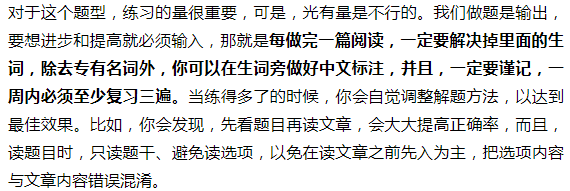英语词法和句法与高考英语语法填空模拟题范文精选
相关文章
高中阶段的英语学习,其实就是学语法、记单词和研究并熟练题型。其中,语法是大多数同学最头疼的问题,原因在于其内容之繁杂和零散。如何才能学好英语呢?小编在这里整理了相关资料,快来学习学习吧!
英语词法和句法与高考英语语法填空模拟题范文精选 1
名词所有格等同于一个形容词,通常只作前置定语。
1.名词所有格的构成方法
1)单数名词词尾加’s:
Jack’s phone
mother’s present(礼物)
复数名词词尾无s时也加’s:
children’s toys
men’s wear(男装)
2)如果复数名词以s结尾则只加’,后面的s必须去除,否则显得累赘,也不方便发音:
radic;teachers’ book
radic;doctors’ work
radic;horses’ tails(马尾巴)
xteachers’s books
3)of+名词
表示有生命的名词,常用’s结构表示所属关系。
表示无生命的名词,就要用“of+名词”的结构来表示所属关系。
the center of acity
城市的中心
the covers of books
书的封面
the top of a mountain
山的顶部
此外,有生命的名词也常常可以用“of+名词”的结构:
the books of teachers
老师的书
the work of doctors
医生的工作
the tails of horses
马的尾巴
英语词法和句法与高考英语语法填空模拟题范文精选 2
1、 at、in、on:如: 常用词组有: at noon, at night
表示时间的 at, in, on:
at 表示片刻的时间,at 8 o’clock,at midnight, at the end of, at that time, at the beginning of, at the age of, at Christmas, at New Year 等。
in 表示一段的时间
如:in the morning, in the afternoon, in the evening, in October, in 1998, in summer, in the past, in the future 等。
on 总是跟日子有关,on Monday, on Christmas morning, on the following, on May Day, on a warm morning 等。
2、表示时间的 since 和 from:since 表示从过去到现在的一段时间的过程,常与现在完成时连用;
from 表示从时间的某一点开始,不涉及与现在的关系。一般多与现在时、过去时、将来时连用。
如:I hope to do morning exercises from today./ We have not seen each other since 1995.
3、表示时间的 in 和 after:两者都表示“在(某个时间)之后,区别在于in表示“在(一段时间)之后” ,而 after 则表示“在(某一具体时间点之后),in 短语和将来时态连用,after 短语和过去时态或将来时态连用。
如:We’ll be back in three days.
After seven the rain began to fall.
What shall we do after graduation?
After two months he returned.
注意:after 有时也可以表示在一段时间之后(常用在过去时里)
4、表示地理位置的 in, on, to:in 表示在某范围内,on 指与什么毗邻,to 指在某环境范围之外
如:Changchun is in the northeast of China./ Mongolia is on the north of China./ Japan is tothe east of China.
5、表示“在...上”的 on 和 in:on 只表示在某物的表面上,而用 in 表示占去某物一部分,表示...上
如:There is a book on the piece of paper./ There is an interesting article in the newspaper./ He dug a hole in the wall.
6、表示“穿过...”的 through 和 across:through 表示从内部通过,与 in 有关;
across 表示“穿过...”,表示从一端至另一端在表面上的通过,与 on 有关。
如:Water flows through the pipe./ The old man walked across the street.
7、in the corner, on the corner, at the corner:in the corn 表示在落,in 指角的内面;
on the corner 表示“在角上” ,on 指的不是内面,也不是外面,而含内外兼有之意;
at the corner指“在拐角处” 指的是拐角外附近的外面。
如:The lamp stands in the corner of the room./ I met at with him at the street corner./ He sat on the corner of the table.
8、in the end, at the end of, by the end of:in the end 作“最后”“终于”解,可单独使用,后不接介词 of;
at the end of 表示“在...末梢”“到...尽头” ,既可指时间,也可以指地上或物体。不可单独使用;
y the end of 作“在...结束时”“到...末为止”解,只能指时间,不可单独使用。
如:In the end they reached a place of safety./ At the end of the road stands a beautiful garden./ They decided to have an English evening at the end of this week./ by the end of last month he had finished the novel.
9、表示“关于”的 about 和 on:两者都有“关于”的意思,不过前者为一般用词,而后者表示“关于” ,为较正式的 “论述”
如:He came to tell me about something important./ He wrote a book on science.
10、between, among:一般说来,between 表示两者之间,among用于三者或三者以上的中间。
如:You are to sit between your father and me./ He is always happy among his classmates.
注意:但有时说的虽然是三个以上的人或东西,如果强调的是两两相互间接关系,适用于between。
如:Agreements were made between the different countries.
在谈到一些事物或一组事物,而把它们视为分居两边时用 between。
如:The little valley lies between high mountains.
在谈事物 间的差别时,总是用 between。
如:They don’t know the difference between wheat, coats and barley.
11、besides, except, but, except for:besides 指除了...还有
如:All went out besides me
except 指“除了,减去什么” ,不能放在句首。
如:All went out except me.
ut 与 except 意思近似,表示“除了...外”经常用在 no, all, nobody, anywhere, everything 等和其他疑 问词后面。
如:I never saw him reading anything but the newspaper.;
except for 表示“如无...就, 只是”表明理由细节。
如:His diary is good except for a few spelling mistakes.
12、表示“用”的 in 和 with:表示工具的“用” 、表示“ ,用 with,而表示材料、方式、方法、度量、单位、语言、声音等的 “用” 用 in。
如:He is writing a letter with a pen./ He wrote the letter in pencil/We measured it in pounds./ Read the text in a loud voice./ Tell me the story in English.
13、charge of 和 in the charge of:in 两者都表示 “由谁负责、照顾、管理” 区别在于: charge of 后接被照管的人或物, in the charge of 后面则跟照管的人。
如:Who is in charge of the project
The project is in the charge of an engineer
14、as, like:as 作“作为”“以...地位或身份”解。
如:Let me speak to you as a father.(事实是父亲)
like 作“象...一样”解
如:Let me speak to you like a father.(事实上不是父亲)
15、in front of 和 in the front of:in front of = before,是“在...前面”的意思(不在某物内)
in the front of 则是“在...前部”的意思(在某物内)
如:There is a desk in front of the blackboard./ The boy sat in the front of the car.
16、in, into:into 表示动向,不表示目的地或位置。
如:We walked into the park.;in 通常表示位置。
We walked in the park;in 和 drop, fall, put, throw, break 等终止性动词连用时,也可以表示动向。
如:I have put the coin in (into) my pocket.我把硬币放进衣袋。
英语词法和句法与高考英语语法填空模拟题范文精选 3
Will
情态动词Will
可用于各人称,表示 "意志"、"意愿"、"决心"、"允诺"等。如:
I will try. 我愿一试。
I will do my best. 我一定尽力而为。
We will never do it again. 我们永远不会再做此事了。
Which will you fake?你要哪一个?
Who will go with me? 谁愿和我一同去?
will在疑问句中用子第二人称时
这时句子表示说话人向对方提出请求或询问。如:
Will you please explain the sentence once more?请你再把这个句子解释一遍好吗?
Will you have western food or Chinese food,Mr. Smith? 史密斯先生,你吃西餐还是中餐?
Will you pass me the butter? 请你把黄油递给我好吗?
注意下面句中的won't亦表请求:
Won't you come in ?请进来好吗?
[注一] 在条件状语从句中须用现在一般时表将来,但当will用作情态动词表意愿时,则亦可用于条件状语从句,如I'll be glad if you will come.(你如愿来,我将会很高兴)。
[注二]will在下面句子中 = I suppose(我猜想)或probably(大概)。如:
This will be the room you are looking for. 这大概就是你要找的那个房间。
You will remember the story I told you the other day.你们大概还记得我那天给你们讲的那个故事。
[注三]will有时表示一种习惯动作或状态。如:
Water will boil at 100 degrees Centigrade.水总是在摄氏100度煮沸。
oys will be boys.男孩子总是男孩子。
英语词法和句法与高考英语语法填空模拟题范文精选 4
One泛指,指代前面提到的那类人或物,用于指代可数名词,相当于a+名词单数,其复数形式ones前一般要有定语,否则就要用some.
That(those复数)即可指代不可数名词,表特指,相当于the+名词,后面经常与介词修饰语连用。 It指代上文出现的名词,表示同类同物,另外还可表示时间、距离、天气、还可指代人称代词,表示性别身份不明,可作形式主语,形式宾语,引导强调句式以及一些固定搭配,如:get it, catch it, make it.
例如:① I have lost my watch. I think I must buy one.我丢了只表,我想我必须再买一只。(代指上文指到的同类事物,但不指同一个)
② Where is my pen? Have you seen it?
我的钢笔不知弄到哪去了,你见了吗?(代指上文提到的同一事物) ③ The land of China is larger than that of America.
④ Tome has a red pen and a blue one (或two blue ones)
⑤ He has no child, and he wants toadopt one (或 some)
英语词法和句法与高考英语语法填空模拟题范文精选 5
词 汇
语 法

阅读理解

完形填空

作 文

听 力

和大家说了这么多,其实,总结起来,高三提高英语水平和成绩的方法只有两个:第一,不怕吃苦;第二,在不怕吃苦的基础上不断调整自己的学习方法,以期寻找到最适合自己的高效学习法。


